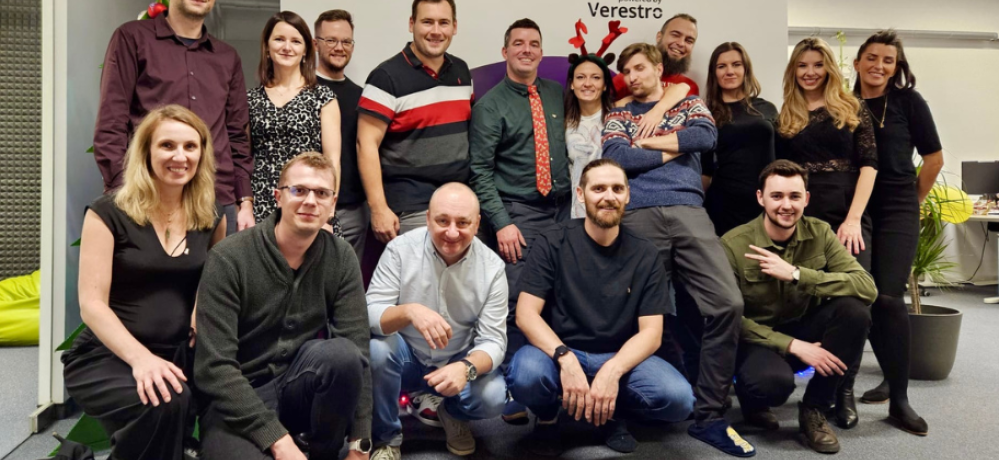Impressive growth at Quicko

The combination of technological advantage, professional advice and an individual approach is the way to become the largest issuer of co-brand cards in the EU - says Tomasz Nagler, Member of the Management Board of Quicko - another fintech company from the portfolio of WP2 Investments.
How did Quicko appear and find its place in the payment market?
TN: Quicko was founded in 2010 (then under the name MLK) for the production and distribution of contactless gadgets in the form of wristbands, key rings or... Ties. A physical payment card was provided by banks or a payment institution, which was placed inside the gadget and after topping up the card, you could pay with such a gadget, which probably aroused ... different feelings at the sellers. These were the beginnings of the introduction of contactless technology in the world, and Poland was one of the first markets where this solution was well received. Quicko gadgets were present at many festivals in Europe and were sent to all continents, but the only thing missing was that the payment card was issued by Quicko.
In July 2019, the "modern" history of Quicko began, as we started as a Small Payment Institution, we obtained a Principal license at Mastercard for issuing cards in 2020, and in 2021 we became a National Payment Institution.
In the last year, Quicko has seen an impressive growth rate among fintechs - how do you want to shape this market? What surprises you? What challenges does it pose?
TN: We have a real chance to shape the development of the fintech market, a.o. in the field of issuing payment cards in the BIN sponsorship model, and this is what we specialize in. Our growth rate was influenced by many factors - including those that were beyond our control, but we are glad that we were able to react appropriately.
The market is maturing surprisingly quickly. A few years ago, companies perceived a payment card as a decorative element or an unnecessary cost. Today, more and more partners are looking for card solutions that are an integral part of their business model – not just a third-rate add-on. This is a huge opportunity and a challenge at the same time: there is growing pressure on quality, scalability and matching the card and payment account from Quicko with the services provided by the partner.
Another challenge is the regulatory pace of changes and requirements – not only in Poland, but also throughout the EU. As a payment institution, we must meet them in order not to give up on innovation. That is why we are investing heavily in internal compliance and AML competences, as well as dialogue with regulators.
In what direction will this area develop? What trends do you see on it and how do you fit into them?
TN: We see several key directions: embedded finance and platformization of financial services, AI in the area of risk and monitoring. The growing importance of transparency and trust, digital identity and a new dimension of KYC, as well as reconciling the needs of fintechs with the interests of banks. We don't underestimate any of them.
What does the market environment and competition look like?
TN: The Polish market of payment services is competitive because it involves both traditional financial institutions and modern specialized fintechs. The introduction of the Payment Services Act in 2011 standardized the rules for the provision of these services, increasing consumer protection and opening the market to new entities, of which there are several hundred in Poland alone. Quicko's direct competition is several dozen companies from the EU.
The increase in the number of payment service providers has increased competition, forcing companies to innovate and improve the quality of service, while increasing the pressure to reduce costs. Technological innovations, on the other hand, change customer expectations and force the avoidance of technical debt at all costs.
A significant market challenge was (and is) adapting to the introduced legal regulations. For example, Quicko's preparation for the Digital Operational Resilience Regulation (DORA) took many months and cost hundreds of thousands of zlotys.
You want to be the largest co-brand card issuer in the European Union - what needs to happen to make it happen?
TN: To achieve such an ambitious goal, we need to combine technological advantage, professional advice and an individual approach. The payment card market in Poland and the European Union more broadly still has a lot of free space – especially in the e-commerce, mobility, retail and virtual asset industries. We are ready to develop this vacant space,
We have a proven flexible infrastructure for issuing payment cards thanks to a partnership with our sister technology company, Verestro. We offer ready-to-integrate modules, fast onboarding and unique experience of working with many industries. A payment card is no longer just a payment instrument – it is a tool for building loyalty, cross-selling and generally strengthening relationships with the end customer.
We are increasingly focusing on a scalable sales model, i.e. promising industries and our own ecosystem of tools supporting integration and analytics, which is an added value for many companies. We focus on working with partners who have a defined group of users and want to build a lasting relationship with them, which is exactly what we do.
Our plans don't just refer to dry numbers. In addition to a year-on-year increase in the number of cards issued and the value of transactions processed, we want to be the first choice for companies that want to build something more than just another financial product – that want to create real value for their customers. We feel that we are on the right track, although of course we remain vigilant.

Who is the best customer for you?
TN: A Quicko customer is a business partner who has its products and services offered on various types of platforms – marketplace, mobile application, widget, website. A payment card issued by Quicko has various functions - according to the partner's wishes. From the very beginning to today, i.e. in less than 2 years, we have exceeded the mark of 350,000 cards issued, we process transactions worth several million zlotys per day.
How does the scaling of your business look like? Where are you today? And what are your goals in this area?
TN: Scaling in a regulated payments industry requires a well-thought-out strategy and operational maturity. At the moment, it is crucial for us to develop scalable processes and expand the portfolio of industries to which we provide payment services. We focus on partner relations with customers, placing the greatest emphasis on personalization, i.e. adapting to the needs of our customers to the greatest extent. This is a necessity when building the Quicko brand.
Today, we are in a phase of intense growth – both in terms of the number of customers and the volume of transactions processed. In the short term, the company's goal is to further increase these ratios in EU countries and enter further regulated markets that fit our business model. We think globally, but we act with the responsibility that comes from our function, which is to store our clients' funds.
Recently, you have gone through an express development - how to control it on many levels. How do you manage the company?
TN: Rapid growth is a huge opportunity, but also a concrete challenge, because speed must go hand in hand with security, trust and compliance. At Quicko, we operate in a strongly cross-functional model – different teams are very close to each other and there is a flat organizational structure, even though in 2024 alone a dozen or so people joined Quicko. We focus on transparent communication, quick iterations and independence. As we grow, we invest in the structure – we build a middle management level that helps to transfer the strategy into operational action.
We also know when to say "no" – controlling growth is not only about expansion, but also about the ability to choose what makes sense for us in many aspects.
I would also like to emphasize that we work in a perfectly matched team with Sebastian Swoboda, the president of Quicko. We complement each other perfectly in full trust, in terms of content and temperament.
How do you withstand the pace and pressure in this dynamic development of the company?
TN: Speed and pressure are inherent in a booming fintech, especially in a regulated sector like payments. The key for me is to manage my time and energy to act. This is helped by prioritizing, delegating along with building confidence and trust within Quicko as necessary elements to make decisions without my participation. I take care of my mental balance through numerous travels, hikes in the Tatra Mountains and watching NBA basketball. I am particularly driven by the awareness that I have a real impact on the development of the company.
Where do you look for inspiration to develop yourself and the company?
TN: I look for inspiration primarily in contacts with people – professionally and privately. I have respect for the knowledge and experience of other leaders, so I ask them for their opinions. I participate in industry events, follow new business models and regulatory trends – especially those that may be disruptive for the market and Quicko. I read publications in the field of psychology to better understand the intentions and sources of human behavior.
Where will Quicko be in 5 years?
TN: We want Quicko to be one of the leading payment institutions in Europe, a recognizable brand among companies that are looking for modern, secure and flexible payment solutions. We strive to be not only a service provider, but a true partner for our customers.
In an ideal scenario, in 5 years we have hundreds of business partners, thousands of contracts signed, millions of cards issued and billions of euros of processing volume 😊
Quicko - licensed issuer of Mastercard cards for the European Union, National Payment Institution. It has been on the market for several years. Leader among card issuers on the European market.